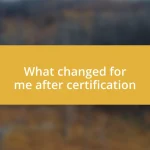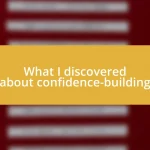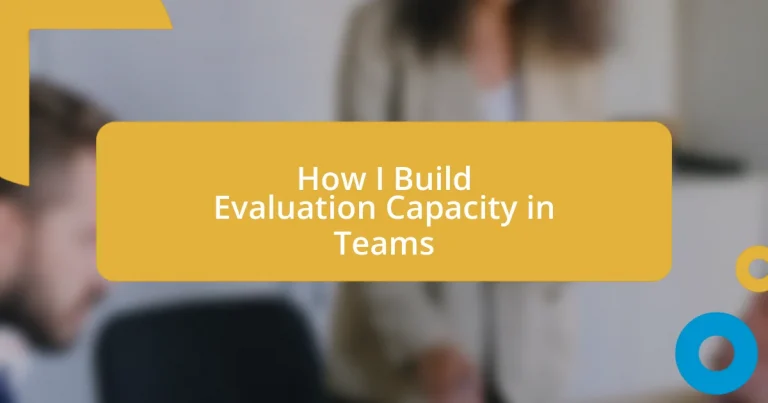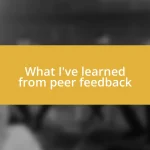Key takeaways:
- Building evaluation capacity involves fostering a culture of reflection and continuous learning, enhancing team morale, decision-making, and collaboration.
- Assessing team competencies through open conversations and structured frameworks helps identify skill gaps, enabling targeted training and development.
- Implementing tools for feedback and data visualization enhances communication and understanding, promoting a learning culture that values growth and celebrates achievements.
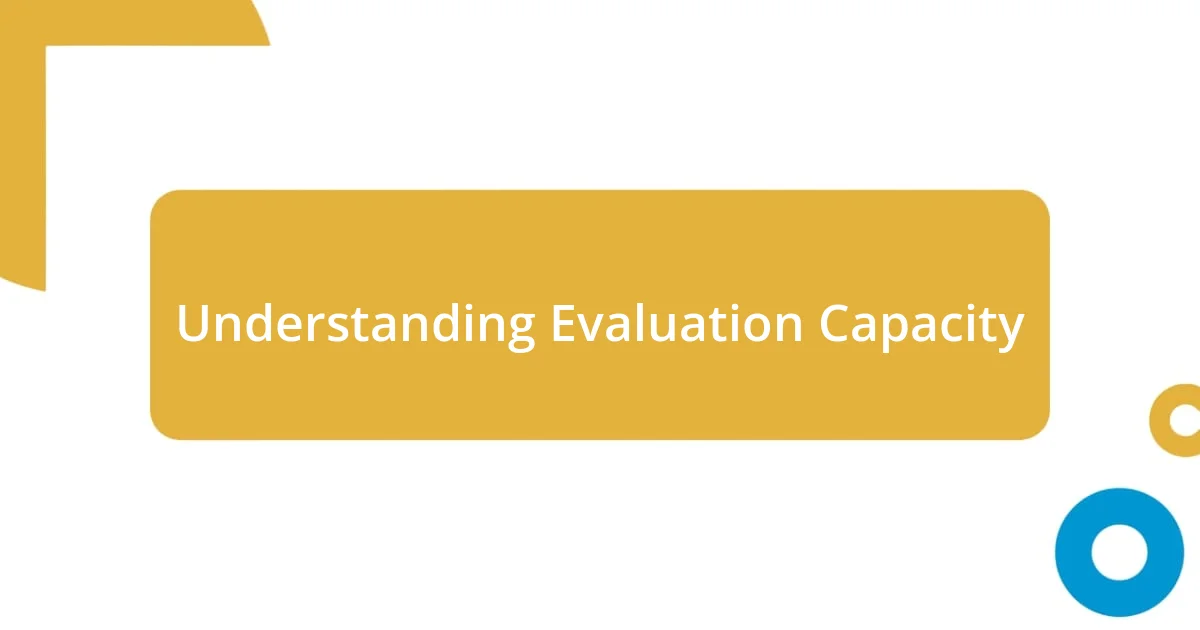
Understanding Evaluation Capacity
Understanding evaluation capacity is about recognizing a team’s ability to systematically assess their performance and outcomes. I’ve seen firsthand how a lack of this capacity can lead to missed opportunities for growth. Imagine a team pouring energy into a project with little idea of its impact—what a waste, right?
Frankly, evaluation capacity isn’t just about collecting data; it’s about fostering a culture of reflection and learning. In a previous role, our team implemented regular feedback sessions that transformed how we viewed our efforts. We learned to celebrate small wins, and I still remember how empowering it felt when team members began to share their insights freely.
One key component is developing skills in data interpretation. I once facilitated a workshop where team members struggled with understanding metrics. However, as we worked through real examples together, their confidence blossomed. I ask you, doesn’t it feel incredible to witness that kind of transformation?
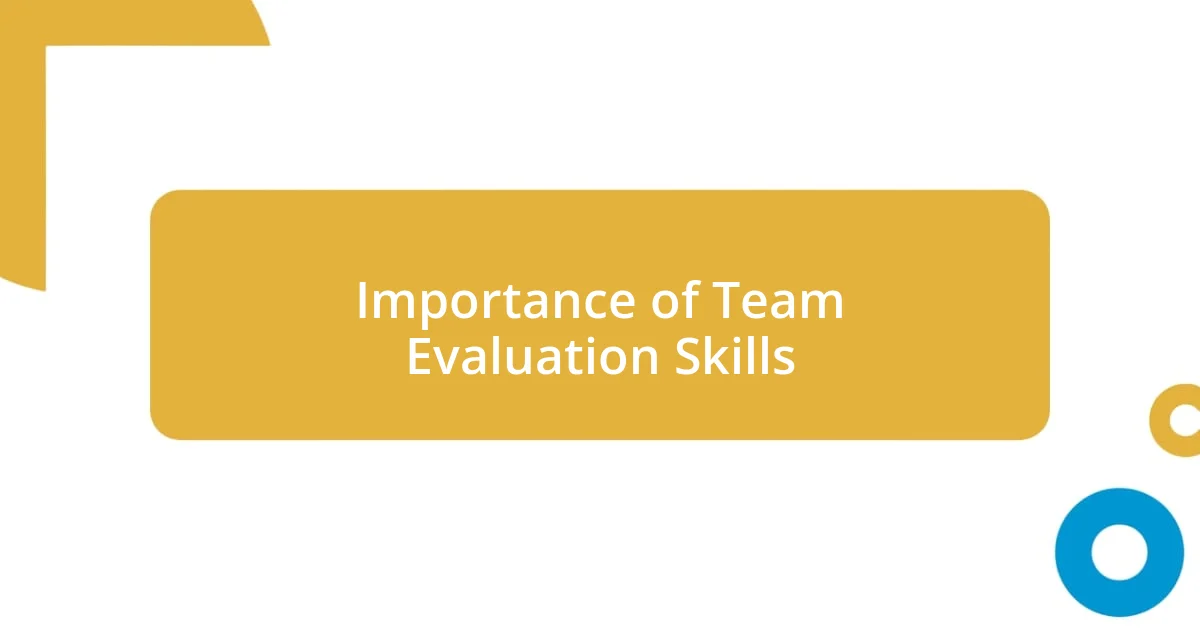
Importance of Team Evaluation Skills
Understanding the importance of evaluation skills in a team context is crucial for success. I’ve often found that teams with strong evaluation skills not only understand their current standing but also are better equipped to pivot and adapt when necessary. I recall a project where, mid-way through, we realized we weren’t meeting the expectations. Instead of pushing forward blindly, our evaluation skills allowed us to reassess and realign, ultimately leading to a more successful outcome.
Here are a few key reasons why developing these skills is vital:
– Boosts Team Morale: When team members see their efforts translate into measurable results, it fosters a sense of achievement.
– Enhances Decision-Making: A team that evaluates its performance can make informed choices about future strategies.
– Promotes Continuous Improvement: Regular assessment encourages a mindset of ongoing learning and adaptation, which can lead to innovation.
– Strengthens Collaboration: Teams that engage in evaluation create an atmosphere of trust and open communication, facilitating better collaboration.
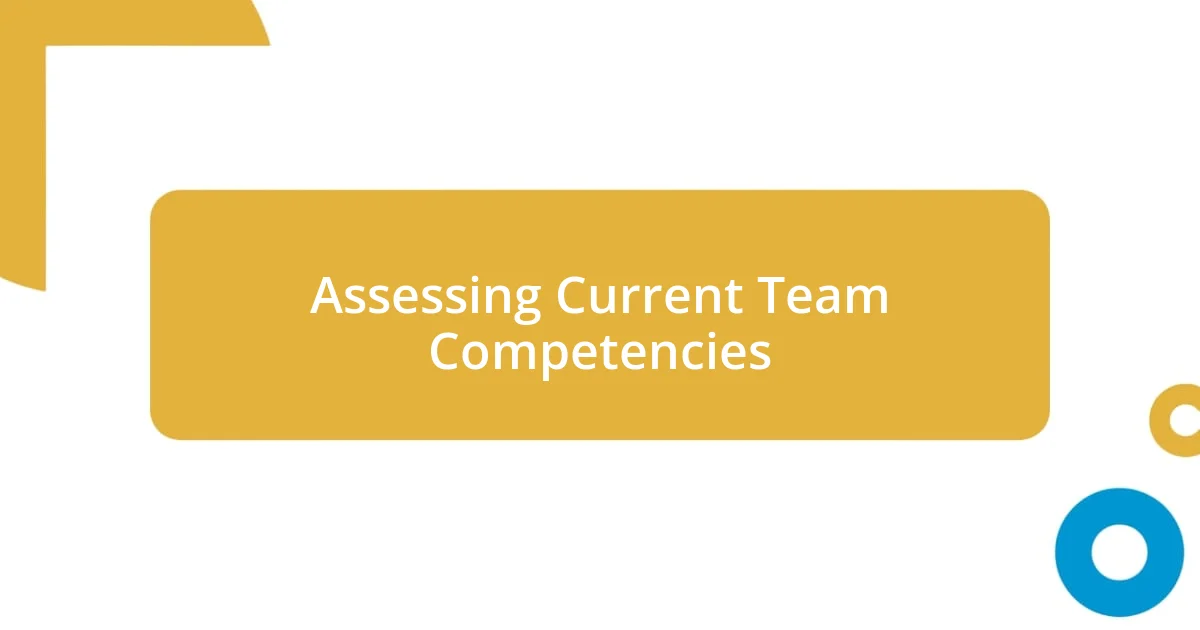
Assessing Current Team Competencies
When assessing current team competencies, I find it invaluable to start with open conversations. Regular discussions about individual strengths and weaknesses can reveal unexpected insights. I still remember a time when one of my colleagues shared their fear of presenting data. This vulnerability opened the floor for others to share their own apprehensions—creating an atmosphere where we could collectively address these development areas.
It’s also essential to evaluate previous project outcomes against the team’s expectations. I’ve led retrospectives where we dissect outcomes, celebrating our achievements while uncovering lessons from mistakes. This process not only enhances our competency assessment but also fosters a shared commitment to improvement. Isn’t it refreshing when everyone is on the same page about what worked and what didn’t?
A practical approach I recommend is utilizing competency frameworks. These can serve as a blueprint, highlighting essential skills and quantifying gaps. In my experience, adapting these frameworks to fit the team’s unique context is key. The dialogue that arises during this evaluation offers a deep look into what competencies we need to strengthen to thrive.
| Assessment Method | Description |
|---|---|
| Open Conversations | Encourages sharing strengths and weaknesses; cultivates a supportive atmosphere. |
| Retrospectives | Analyzes previous projects to celebrate successes and pinpoint areas for growth. |
| Competency Frameworks | Provides a structured approach to identify skill gaps and developmental needs. |
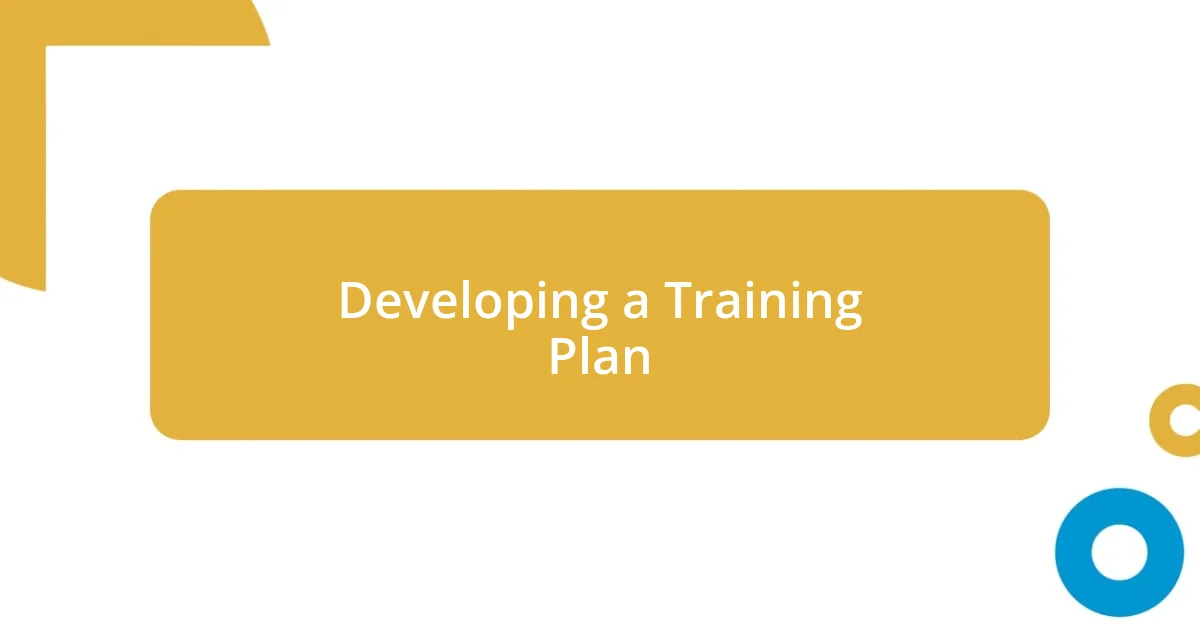
Developing a Training Plan
Developing a training plan starts with identifying specific skill gaps that emerged during our competency assessment. In one memorable instance, our team struggled with data analysis, which impacted our project timelines. It was eye-opening to see how this lack of skill caused stress and frustration among team members. By pinpointing this area, I felt more equipped to design targeted training sessions that genuinely addressed our needs.
As I crafted the training plan, I ensured to incorporate various learning styles. I’ve seen firsthand how a one-size-fits-all approach can fall flat. For instance, during a previous training, I noticed that some team members thrived in hands-on workshops while others preferred to engage with online modules. By offering a mix of formats, I aimed to create an inclusive environment where everyone felt supported in their learning journey. How do you think diverse training methods impact team engagement?
Lastly, I’ve found it vital to include follow-up sessions in the training plan. These checkpoints help reinforce what we’ve learned and assess our progress. After one project, my team implemented a monthly “skill-share” meeting. It was rewarding to see members confidently showcase their new skills, and it fostered a culture of continuous learning. I believe that when you invest in ongoing training, you cultivate a curious and resilient team ready to tackle future challenges.
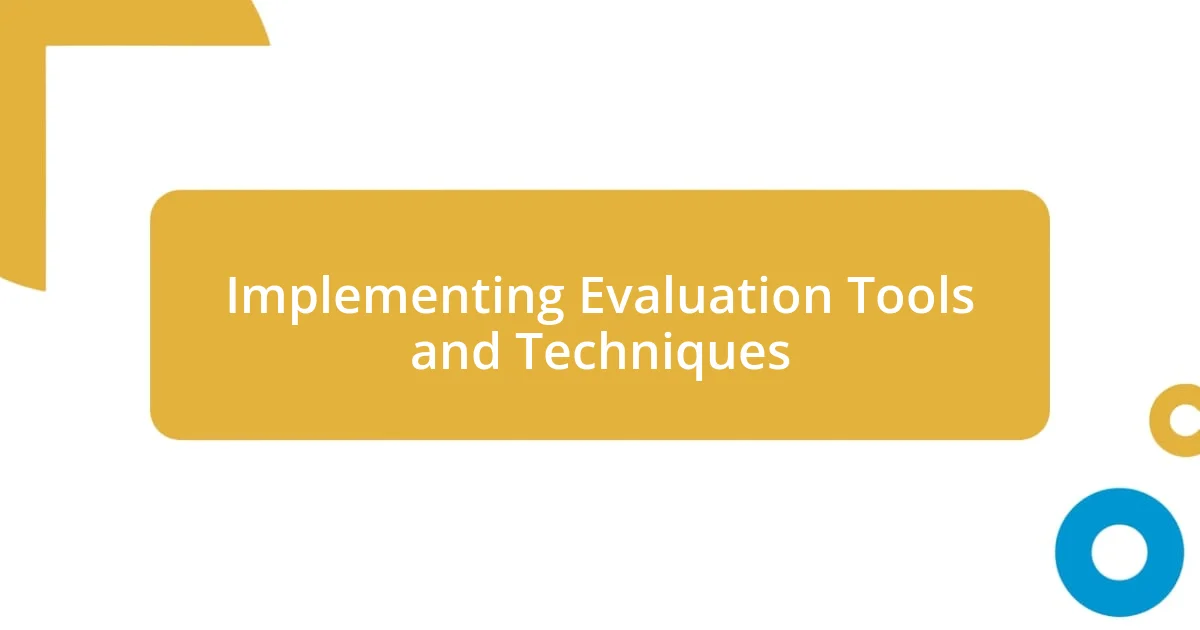
Implementing Evaluation Tools and Techniques
Implementing evaluation tools and techniques is a powerful way to enhance a team’s capabilities. I’ve realized that choosing the right tools requires a solid understanding of the team’s objectives. For instance, during a project where miscommunication was prevalent, I introduced collaborative platforms like Trello. The visual task boards not only streamlined our workflow but also reduced confusion—we could finally see who was doing what at a glance. Have you ever tried a tool that transformed the way your team communicates?
In my experience, feedback tools also play a crucial role in fostering growth. After integrating anonymous feedback surveys, I noticed a shift in our team dynamics. Initially, there was hesitation around providing honest opinions, but over time, the tool helped surface valuable insights. One instance sticks with me—after receiving constructive criticism, a teammate expressed feeling more empowered to share their ideas. The evolution in our discussions made me realize how much people valued having a safe space to voice their thoughts.
Lastly, I found that utilizing data visualization techniques can dramatically enhance our understanding of complex information. I remember creating easy-to-read charts that mapped our performance metrics after a big project. This approach sparked deeper discussions about our outcomes. Seeing the data visually can trigger questions like, “What trends do we notice?” This practice not only clarifies insights but also reinforces the sense of ownership among team members. Isn’t it fascinating how visuals can sometimes say what words cannot?
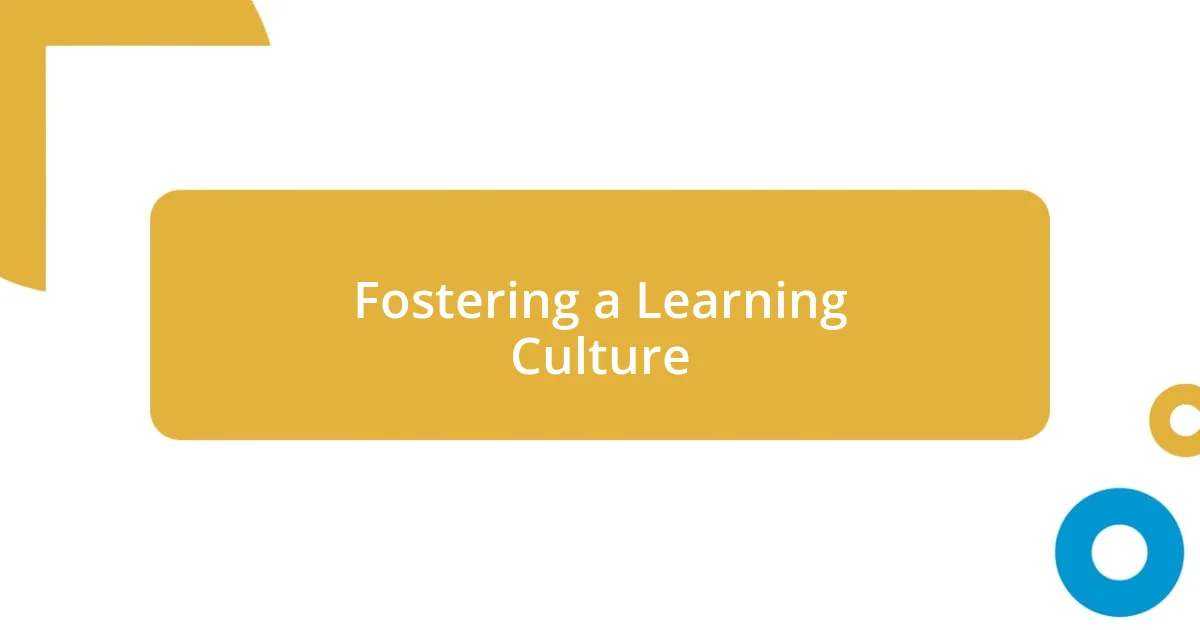
Fostering a Learning Culture
Fostering a learning culture is about creating an environment where curiosity and growth flourish. In my own journey, I remember a time when I encouraged open discussions about mistakes during our team meetings. Instead of shying away from errors, we celebrated them as learning opportunities. This shift not only eased tension but also fostered a sense of camaraderie. I often wonder how openly sharing our missteps could reshape perspectives on failure; how could your team benefit from embracing this philosophy?
I also believe that mentorship plays a crucial role in building a learning culture. During one challenging project, I paired less experienced team members with seasoned veterans. Watching them collaborate was truly inspiring. The energy in the room shifted as knowledge was exchanged freely, creating not just skill improvement but stronger bonds within the team. Has mentorship been a part of your team’s growth strategy? I’ve seen it transform dynamics in ways that benefit everyone involved.
Moreover, I find that celebrating achievements—no matter how small—helps solidify a culture of learning. For example, we established a “Wall of Wins” where each team member could post successes, both individual and collective. This simple act infused positivity into our daily routines and reinforced the value of continuous improvement. It made me reflect on how recognition fuels motivation—how do you ensure your team feels valued for their efforts? Every little acknowledgment sends a powerful message that learning and growth are not just expected but celebrated.
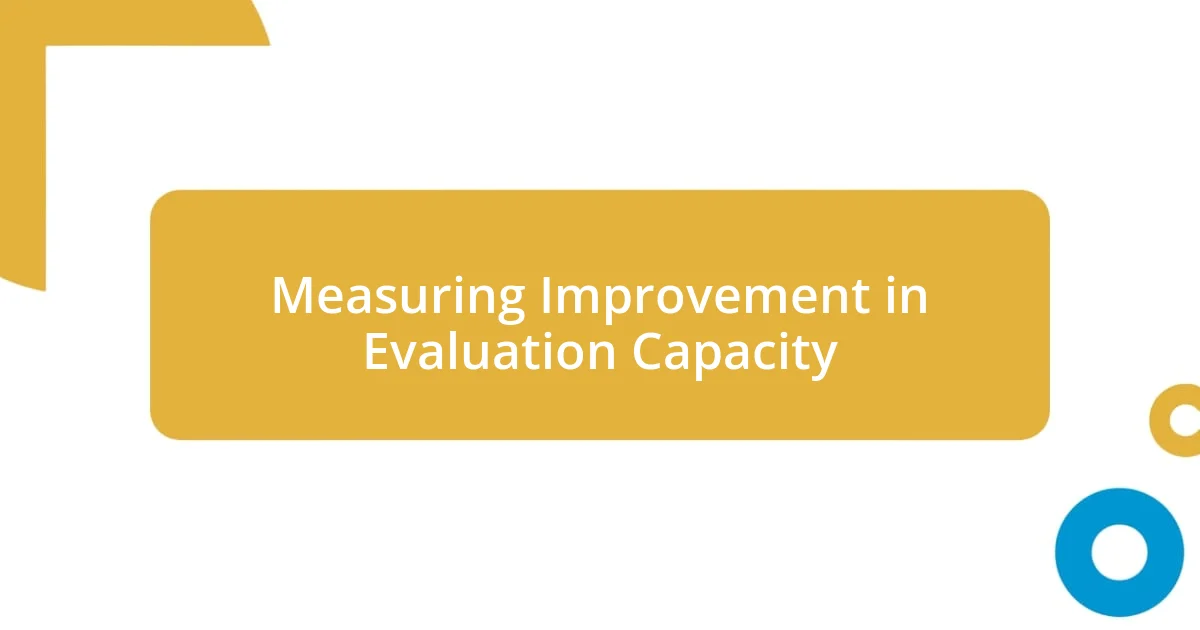
Measuring Improvement in Evaluation Capacity
Measuring improvement in evaluation capacity is essential for understanding how far a team has come. I recall a specific project where we set clear benchmarks and regularly assessed our progress. Each time we hit a milestone, it felt incredibly satisfying, like crossing the finish line of a race where every small step counted. Can you think of a time when tracking progress invigorated your team?
I’ve found that employing self-assessment tools can create a profound impact. After one particularly insightful review session, team members expressed how they never realized their own growth until quantifying it. Witnessing their epiphanies sparked a collective sense of pride and accountability—a true testament to the power of reflection. How might your team benefit from such self-discovery?
Moreover, I believe that peer evaluations add significant value. I introduced this at a time when our performance metrics felt stagnant. The feedback conversations that emerged transformed our approach, guiding us to focus on our strengths and areas for improvement collaboratively. It’s amazing how facilitating honest dialogue can propel a team forward—wouldn’t you agree that fostering open communication is fundamental to success?









